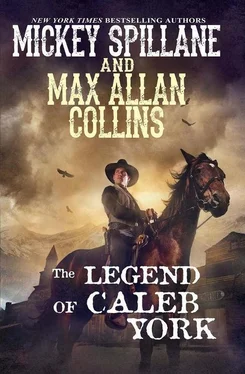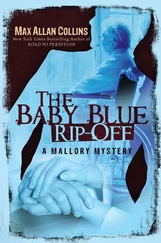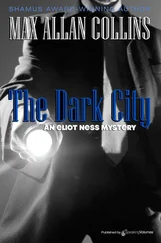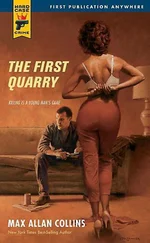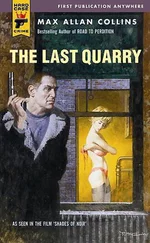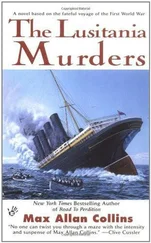“I won’t fault you,” she said. “I believe you may have saved my life.”
He nodded toward the sheriff, presently conferring with the undertaker. “You may have already returned the favor.”
“Mister!”
They turned and Tulley was walking the dappled gelding toward them. “Here’s your horse! Didn’t get far.”
“Thanks, Tulley.” He took the reins from the old man. “Sorry about borrowing your bed.”
The feed bag was no longer on the animal.
“Oh, it fell off back there a ways,” Tulley said with a good-natured grin shy a few teeth. “Broke apart where it hit. Maybe somethin’ will grow!”
“Maybe,” the stranger said, and patted the old man’s shoulder, “you can sleep at the stable tonight.”
“Didn’t earn enough of my keep over there today for that, mister.”
“You tell Hitchens I’ll pay your freight tomorrow.”
Tulley beamed. “You’re a fine human man, mister. Fine human man.”
The desert rat headed toward the livery stable with some spring in his step.
Smiling, Willa said, “I guess you do make friends everywhere you go. Where are you going tonight? You staying here, at the hotel maybe?”
“I told you,” he reminded her. “The intention was to ride out to your ranch and have a talk with your father. Wanted to wait till after dark so as not to advertise.”
“Your intention, huh? Like your intention to just pass through Trinidad?”
“Sometimes I get sidetracked.”
“I’ll lead the way, then,” she said. “Let’s ride out to the Bar-O together.”
He chuckled. “You sure you know which side I’m on in this fracas?”
“Not really,” she said. “But I’m starting to get a hunch.”
“Based on what?”
“Let’s just say that anybody who guns down four of Harry Gauge’s deputies in one day is at the very least not on the sheriff’s side.”
“How about your good side?”
“We’ll see.”
They rode out together, past Gauge and Deputy Rhomer, who grinned at her lasciviously as they went by.
She did not hear what Rhomer said to his boss: “You might have to pay a big price, Harry, if you ever want to own that one.”
Nor did she hear Gauge’s inelegant response: “Shut up,” plus a nasty name she’d never heard, even growing up on a ranch.
They kept the pace brisk, if not hard, on the twenty-minute ride out to the Bar-O.
They didn’t speak, the stranger lagging just behind Willa, who after all knew the way. They brought their animals to an easy trot as they headed down the hard-packed lane under the overhang displaying the ranch’s brand. The stranger, she noted, was taking it all in with what seemed to her an almost childlike sense of wonder.
She couldn’t blame him.
In the ivory moonlight, the ranch buildings had an austere beauty that nearly brought tears to Willa’s eyes, in the midst of this struggle to hold on to what her father had carved out of the wilderness.
The stranger dismounted and tied up his dappled gelding at the post in front of the main house, where the front-room windows glowed with the muted light of kerosene lamps. She was tying up Daisy when her father came out quickly with foreman Whit Murphy tagging after.
Papa, as he stood on the porch staring out sightlessly, obviously having heard two horses arrive, called tentatively, “Willa... do we have a guest?”
“We do, Papa,” she said, approaching the stairs up to the porch. The stranger fell in behind her at a respectful distance. “I brought him with me.”
Her father walked to the edge of the stairs and rested a hand on a rough beam. “I’m guessing there’s a story to be told here, daughter. You don’t have this man at gunpoint by any chance...?”
The stranger stepped forward, came up alongside her. “No, Mr. Cullen,” he said pleasantly. “And she’s not at gunpoint, either.”
“Relieved to hear that.”
“I’m here of my own free will. I presume... as a guest.”
“You are indeed my guest.”
“Thank you. And there is a story to be told. But I’m going to let Miss Cullen here tell it. She saw all of the action firsthand.”
The old man’s face, despite the easygoing manner of the stranger’s speech, was taut with concern. “Willa dear, are you all right?”
“I’m fine,” she said, adding lightly, “Except for being a target.”
Perhaps to head off any worry her flippant remark may have caused, the stranger said, “ I was the target, sir. But we’re both without a scratch.”
There, in the moonlight, she gave her father — and Whit, too — a succinct account of the ambush attempt and how their guest had saved her by pushing her to the street, and how he had gunned down his two attackers. She related, too, the way the old desert rat Tulley had made a second witness, leaving Sheriff Gauge helpless to arrest a man who had shot two more of his deputies. Especially there in front of half the town, attracted by the commotion.
Relieved now, even pleased, her father gestured toward the front door, his eyes seeking the stranger but not quite sure where to look. “Well, I owe you, friend, for my daughter’s safety if nothing else. Come in, come in, both of you. We have much to talk about.”
The stranger said, his voice absent of inflection, “Do we?”
She put a hand on his arm. “You’re committed now. I think you’d better.”
He looked at her, expressionless. But something in his eyes...
“I could use some coffee,” he said with a shy smile, as if that were an admission of guilt.
Papa beamed and gestured again, rather grandly, to where a somewhat disgruntled-looking Whit held open the door. “We already got some going,” her father said.
The fire was going, too — the night was that chilly. Willa ushered the stranger to one of the two big rustic, Indian-blanketed chairs angled toward the fire, and Whit got chairs for himself and her, positioning them on either side of the larger ones.
Willa took their guest’s curl-brimmed hat with its cavalry crease and hung it on a hook near the door. Whit, to his credit, was taking care of getting coffee for everyone. A rough-hewn table, fashioned decades ago by her father, sat between the two bigger chairs, providing a resting place for the china coffee cups.
They sat washed in the orange flickering glow, with Whit seating himself next to the raw-boned dude as she nestled in near her father.
Bluntly, Whit said, “Just who the hell are you, mister?”
He turned toward Whit with the faintest smile. “Just who the hell are you ?”
“Whit Murphy,” he said, pounding his chest with the underside of a fist. “Bar-O foreman. See, that ain’t a hard question to answer at all. No more beatin’ around the bush. No more shilly-shallying.”
The stranger’s smile broadened. “You’d be surprised how rarely I shilly-shally.”
Whit seemed at the boiling point and her father must have sensed it, because he said, “Why keep your name to yourself, mister?”
With no challenge in the words at all, the stranger said, “That’s kind of my business, isn’t it?”
Papa drew a breath in, let it out slow. Flames reflected on the milky eyes. “I may not know your name, but I know who sent you. Raymond Parker, of Denver... isn’t that right?”
The stranger seemed mildly confused. “Why should he?”
Sitting forward, Willa said, “Mr. Parker and my father were partners years ago. They started this ranch together, and Mr. Parker sold his share to Papa and went on to make his own fortune in Colorado.”
“Quite interesting, I’m sure,” the stranger said.
Willa said, “Mr. Parker is who my father sent the wire to, seeking Wes Banion. To get rid of Harry Gauge.”
Читать дальше
